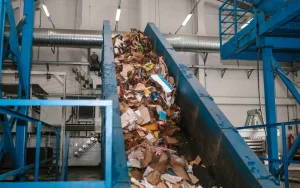Malaysia is poised to become a regional leader in waste management and recycling, with increasing opportunities for businesses to tap into this growing sector. As environmental concerns rise and regulations tighten, the industry presents significant economic potential while driving positive environmental and social impact. For Malaysia, embracing sustainable waste solutions not only addresses pressing environmental challenges but also boosts economic growth, job creation, and technological innovation.
The Current Waste Management Landscape in Malaysia
Malaysia generates approximately 38,000 tonnes of solid waste daily, with only 24% being recycled, according to government reports. Rapid urbanization, industrialization, and changing consumption patterns have intensified the country’s waste generation. While waste management systems have improved over the years, issues such as illegal dumping, over-reliance on landfills, and low recycling rates remain major challenges.
To tackle these problems, Malaysia has been focusing on initiatives like the National Solid Waste Management Policy and Malaysia’s Roadmap Towards Zero Single-Use Plastics 2018-2030. These frameworks signal a strong commitment to improving waste management practices and creating a circular economy.
Business Opportunities in Waste Management and Recycling
The waste management and recycling industry in Malaysia offers lucrative opportunities across multiple segments. Entrepreneurs, investors, and established businesses can seize these prospects while contributing to sustainability goals.
1. Recycling and Resource Recovery
- The recycling sector is a significant growth area, with opportunities in plastics, paper, metals, and e-waste recycling.
- Malaysia has become a major hub for plastic waste processing in Southeast Asia, offering potential for businesses to implement advanced recycling technologies.
- Companies focusing on upcycling materials into new products or raw materials can capitalize on rising demand for sustainable alternatives.
2. Waste-to-Energy (WTE) Projects
- Converting solid waste into energy is an emerging sector in Malaysia, supported by government initiatives to reduce landfill dependency.
- Businesses can explore WTE technologies to generate renewable energy while managing municipal and industrial waste.
3. Smart Waste Management Solutions
- Innovations such as AI-driven waste sorting systems, IoT-enabled bins, and data-driven waste collection processes present opportunities for tech companies and startups.
- Implementing smart waste management can help municipalities and corporations reduce operational costs and improve efficiency.
4. Composting and Organic Waste Management
- Malaysia generates a significant amount of food and agricultural waste, creating opportunities for businesses specializing in composting and organic waste solutions.
- Companies can produce high-quality organic fertilizers and biofuels while reducing methane emissions from landfills.
5. E-Waste Management
- With growing electronic consumption, e-waste has become a critical concern. Businesses can tap into collection, dismantling, and recycling processes to recover valuable materials like metals and plastics.
Positive Impact on Malaysia’s Economy
Investing in waste management and recycling brings multifaceted benefits to Malaysia’s economy. These include:
1. Job Creation
- The waste management and recycling industry is labor-intensive, offering employment opportunities across collection, sorting, processing, and manufacturing.
- Small and medium-sized enterprises (SMEs) can thrive in this sector, fostering entrepreneurship and local economic development.
2. Economic Diversification
- The industry reduces Malaysia’s reliance on resource extraction and landfilling while unlocking new revenue streams.
- Exporting recycled materials and technologies positions Malaysia as a regional leader in the circular economy.
3. Attracting Investments and Partnerships
- The increasing focus on sustainability attracts foreign direct investments (FDIs) and partnerships with global players in waste management.
- Strategic collaborations can drive innovation, infrastructure development, and knowledge sharing.
4. Cost Savings for Municipalities
- Implementing efficient waste management systems reduces the burden on local governments and taxpayers, lowering costs associated with landfills and waste disposal.
5. Environmental and Social Benefits
- Improved waste management reduces pollution, protects natural resources, and minimizes greenhouse gas emissions, aligning with Malaysia’s sustainability goals.
- Cleaner cities and healthier environments enhance quality of life and attract tourism and business investments.
Government Support and Policy Framework
The Malaysian government has taken proactive steps to encourage investments in waste management and recycling. Policies such as tax incentives, grants for green technologies, and public-private partnerships create a favorable business environment. For instance:
- The Green Technology Financing Scheme (GTFS) supports businesses investing in sustainable solutions.
- The Extended Producer Responsibility (EPR) framework encourages manufacturers to take accountability for the lifecycle of their products.
By strengthening policies and fostering collaboration, Malaysia is paving the way for a sustainable waste management ecosystem.
Conclusion: A Win-Win Opportunity for Businesses and Malaysia’s Economy
The waste management and recycling industry in Malaysia is not only a critical solution to the nation’s environmental challenges but also a lucrative business opportunity. By leveraging innovation, infrastructure development, and sustainable practices, businesses can drive economic growth while helping Malaysia transition toward a circular economy.
As Malaysia positions itself as a regional leader in waste management, the positive impact on job creation, economic diversification, and environmental preservation will ensure long-term prosperity for the nation. Entrepreneurs and investors who seize this opportunity stand to gain financially while contributing to a greener, cleaner Malaysia.




